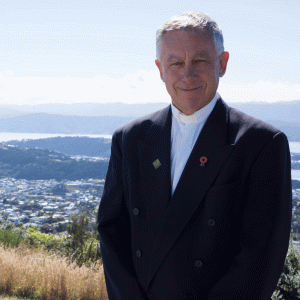WelCom October 2018:
“This poor man cried, and the Lord heard him” (Ps 34:6)
– The opening words in his Holiness Pope Francis’ Message for the Second World Day of the Poor, 18 November 2018.

Cardinal John Dew, Archbishop of Wellington
When we read in Scriptures that God hears the cry of the poor, it doesn’t just mean noticing passively; it means that God hears and responds.
Stepping up our efforts to listen to the poor is the key message of Pope Francis’ Message for the Second World Day of the Poor, which we will be celebrating on 18 November 2018 in association with the worldwide Church, but particularly in the company of 11 other Dioceses around the world [see story page 1].
Pope Francis’ message invites us all to ‘make a serious examination of conscience, to see if we are capable of hearing the cry of the poor’. He says to do this, we may need to be silent in order to listen. ‘If we speak too much ourselves, we may be unable to hear them.’
I have the privilege of hearing many voices from around our Archdiocese. Some that stand out include families in post-earthquake Kaikōura counting out slices of bread to ensure their remaining loaf would last until the next benefit day; a former Eucharistic Minister to the Sick now confined to her home by illness but too shy to ask someone to bring her communion; and a young woman with a 15-month-old baby who told last year’s Anglican and Catholic Housing Election Forum that she had nowhere to live.
It includes people who came to the Archdiocesan Benefit Impact in Naenae last year having to make choices between buying food or buying medication; Catholic school teachers sharing their own food with students without lunch; and former refugees longing to be reunited with a loved one still living in a place of danger.
Our Archdiocese covers a wide geographic territory, and the experiences and perspectives of people in rural parts of the Archdiocese are different those in urban centres. Our parishes and schools also include the spectrum of socio-economic differences, and the experiences and perspectives of families at a low-decile school are different to those at a high-decile school. Our communities include large families as well as people living alone; people in good health and people living with illness and disability; people who have lost homes and businesses to an earthquake and people who haven’t had that experience.
You may be someone who experiences poverty and exclusion in any or all of its forms; or you may be a person who has been fortunate enough not to experience poverty and exclusion. The World Day of the Poor is for all of us. It is an opportunity Pope Francis is offering in our lives and in the Church’s calendar for encounter, dialogue and practical assistance. For some it will be a moment to speak up and share experiences with others, and for others it may be a moment to stop speaking and to listen and to be called to action.
“God’s answer to the poor is always a saving act that heals wounds of body and soul, restores justice and helps us to live life anew in dignity.”
I know finding those opportunities to listen can be hard. One place people might like to start is to watch the short videos produced by Radio New Zealand as part of their Minimum series. They are available on the RNZ website under the title: ‘The reality of life on the minimum wage in NZ’. [radionz.co.nz/news/in-depth/366084/the-reality-of-life-on-the-minimum-wage-in-nz]
Although the focus in the title is on wages – and people do talk about the difficulties they have paying bills and making ends meet financially – a constant theme that stands out is the lack of respect and dignity people experience. Stories include that of a female cleaner describing how men ignore the cleaning sign and just go to the toilet in front of her.
Echoing Pope Francis’ concern that many people have developed a ‘throw-away mentality’ is a call centre worker who describes being treated as ‘the most disposable person there is because there will always be an influx of people who are just as desperate for work’. And a home-care worker who says, ‘It made me feel less than nothing really when you couldn’t afford to go to your own family’s tangi’.
To use again the words of Pope Francis in his Message for the Second World Day of the Poor, ‘God’s answer to the poor is always a saving act that heals wounds of body and soul, restores justice and helps us to live life anew in dignity.’
And God’s answer is ‘a summons to us to do likewise’. In celebrating the World Day of the Poor, let’s embrace this opportunity to listen and to respond. In a country and a world increasingly marked by inequality and division, let’s be a sign that we are better off when we are together.
Pope Francis’ Message for the Second World Day of The Poor on the Vatican website: w2.vatican.va or via: tinyurl.com/World-Day-of-The-Poor-2018